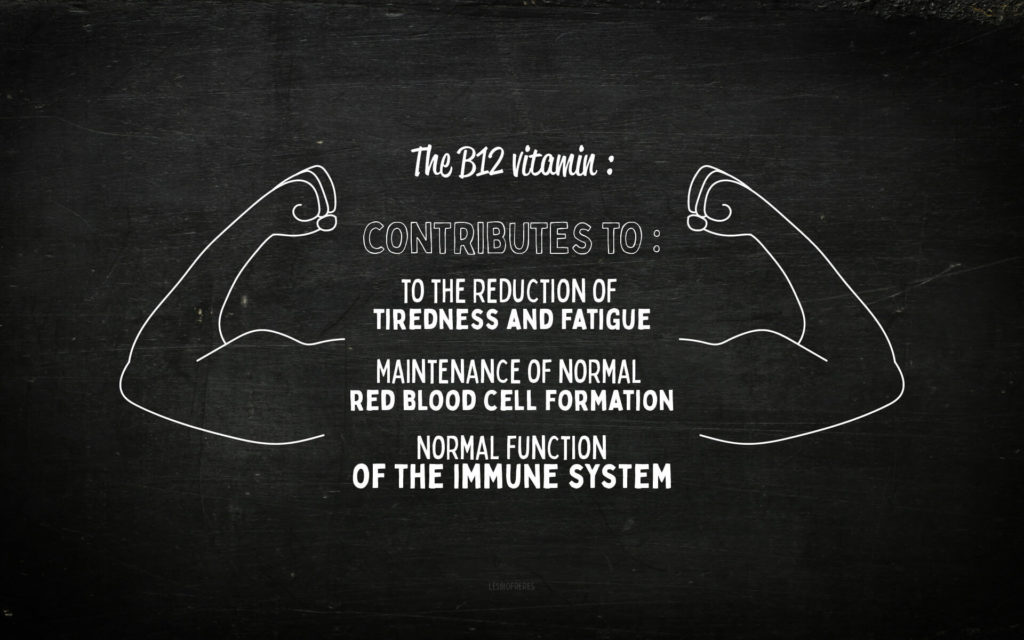Vitamin B12: the complete guide for vegetarians and vegans
Reading time: 5 minutes | Written with love by: Alexis
Whether you are vegetarian or vegan, having a healthy and varied diet is not enough to be healthy. It is essential to supplement with vitamin B12. That's good, we produce a B12 (the betwelve for friends) of superior quality! You can therefore take our word for it, or read our super comprehensive guide that answers everything you always wanted to know about vitamin B12 but were afraid to ask.

Let’s start with the history of B12
The first reference to a vitamin B12 deficiency appeared long ago in 1849.
Vitamin B12 deficiency was considered lethal up until 1926 when the doctors at the time discovered that a diet based on animal liver (and yes, discoveries often involve trial and error…), rich in vitamin B12, would slow down the process of the disease which resulted in severe anaemia.
Patience….I will come back to this subject.
How do you know if you are deficient in vitamin B12?
Vitamin B12 deficiency mainly results in an anaemic state, i.e. a decrease in red blood cells.
Your red blood cells carry oxygen from your lungs to your organs. If you are anaemic, your organs will have less oxygen supply.
The primary role of oxygen is to convert nutrients from digestion into “pure” energy. This energy can be used at any time by the cell. This energy conversion takes place in the cell in small organelles called mitochondria, which are the powerhouse of the cell.
In the presence of oxygen, they convert one molecule of glucose into 36 units of pure energy called ATP, clever no?
But without oxygen, they can only produce two…
What does vitamin B12 do for your body?
- reduction of tiredness and fatigue
- maintenance of normal red blood cell formation
- normal functioning of the immune system
In short, without it, it’s a total mess…
The first test prescribed by the doctor when faced with symptoms of anaemia is the haemogram, also known as the CBC: complete blood count. This test was made famous by the series ER and Dr. House and is associated with the measurement of haemoglobin, the protein that transports oxygen within the red blood cell.
The red blood cells are simply counted and related to the haemoglobin level.
When your haemoglobin level is less than:
- 13 grams per decilitre (g/dl) in men,
- 12 g/dl in women
- and 10.5 g/dl in pregnant women from the 2nd trimester of pregnancy…
…you are anaemic.
The morphological analysis of the red blood cells will then indicate the type of deficiency.
What foods are rich in vitamin B12?
Vitamin B12 is usually only synthesised by bacteria
The human body is not able to produce it itself and our symbiotic bacteria do not have the right conditions to do so (that’s a shame).
For an omnivorous human, no worries, they can find their supply from the meat they eat, as ruminants, among others, have developed symbioses with the appropriate bacteria which find themselves in favourable conditions to produce B12.
For vegetarians and vegans it is more complicated.
B12 is found naturally in certain plants (chlorella, comfrey, nori, spirulina). Unfortunately, these plant forms are not bioactive, so our body is not able to get the benefits we expect.
But don’t panic, there are two options :
B12 from bacterial culture in the lab
B12 can be extracted and purified from a laboratory bacterial culture. This is called Cyanocobalamin (more on this later), an industrial form of B12 that is not found in nature (not great).
B12 of natural origin
Our B12 comes from the symbiosis between good bacteria and shiitake mushrooms.
The shiitake soil is inoculated with bacteria capable of producing vitamin B12, the same bacteria that can be found in B12 producing animals.
The Shiitake naturally enters into symbiosis with these bacteria, as is the case in nature, the vitamins produced will then be concentrated in the Shiitake and we will be able to benefit from them by eating it.
Not all forms of B12 are created equal
Vitamin B12 in its pure form has another name: cobalamin.
As we have seen above, cobalamin is produced by bacteria but it exists in different forms:
Cyanocobalamin, Methylcobalamin, Hydroxocobalamin , and the famous Adenosylcobalamin.
Cyanocobalamin: the “synthetic” B12
This is the so-called “synthetic” form, produced from bacterial fermentation, the process of which is controlled from A to Z in the lab.
Unfortunately this form is not found in nature, it is not bioactive (the human body cannot use it as it is) and requires 4 stages of transformation to become so, which can reduce its effectiveness.
It is a form frequently used in food supplements but as it is not natural we have chosen not to use it in our products.
Methylcobalamin & Adenosylcobalamin: the active forms of natural origin
For our famous Bio Frères Betwelve, we preferred to opt for vitamins of natural origin.
Our recipe is therefore composed of Methyl and Adenosyl, both of which are of natural origin and are directly bioactive. They do not require any transformation by the organism to be used and play their important role in the biological processes described below (DNA, brain, muscle energy…).
Hydroxycobalamin
Hydroxy is found in nature, is not bioactive and requires 3 stages of transformation.
It is also part of our little cocktail of Cobalamins.
A little chemistry to understand a bit more
To go a little further (but not too much, I promise) hang on, we’re getting into the chemistry. (If you don’t want to know more, go directly to the summary).
Cobalamin acts as a co-factor (a molecule necessary for the biological activity of another) of methionine synthase and L-methyl-malonyl-CoA mutase.
It has a role in haematopoiesis – the formation of red blood cells needed to avoid anaemia.
It plays an essential role in the synthesis of Methionine! Cobalamin therefore acts as a co-factor for methionine synthase, which catalyses the final stage of methionine biosynthesis.
But what is methionine and what does it do?
Thank you for asking the question, please fasten your seatbelt..
Methionine is a so-called essential amino acid that plays a key role in protein biosynthesis. Amino acids are molecules that combine to form proteins.
They play a crucial role in the daily life of every cell of living beings, having a decisive role in most biological processes. Methionine for a healthy liver, enables regeneration of liver cells and prevents fatty deposits from forming in the liver.
Methionine is a natural anti-oxidant and helps to combat cell ageing.
Methionine synthase is also essential for the synthesis of purines and pyrimidines, the bases of our DNA, in other words the very structure of our DNA. Since this enzyme works with cobalamin, it is best not to be deficient.
Cobalamin is also the co-factor for methylmalonyl-CoA mutase, which converts methylmalonyl-CoA into succinyl-CoA.
Succinyl CoA is part of the Krebs cycle which allows the mitochondria to produce pure energy or ATP (here we go again). Once again, we see that a generalized fatigue sets in in a state of deficiency.
In addition, if there is no vitamin B12 then methylmalonyl-CoA tends to accumulate and would be responsible for the neurological effects associated with the deficiency.
To summarise
Vitamin B12 is essential for the formation of red blood cells, DNA repair and synthesis and protection of the nervous system.
How to supplement properly with B12?
The European Food Safety Authority (ESFA) recommends 4µg (micrograms) for vitamin B12 for adults.
This value was set by a committee of experts at a European Union level.
The mysterious recommended daily allowances
The recommended values do not take into account the absorption phenomena that come into play when taking food supplements. Food supplements can be taken in two different ways:
- so-called “passive” absorption, during which the body makes no effort, the vitamin B12 is simply diffused through the mucous membranes
- and so-called ‘active’ absorption, during which the body secretes proteins that transport and stabilise the vitamin B12 up to the intestinal receptors
Active absorption is generally for vitamins present in animal products where small amounts are present. During evolution, we have therefore developed mechanisms to improve its absorption.
During chewing, vitamin B12 is protected from gastric acidity by salivary proteins, the “intrinsic” factor secreted by the stomach binds to vitamin B12 to allow it to pass efficiently through the intestinal mucosa and be distributed to the cells.
The major concern for vegans is the passive absorption via pills or tablets that don’t require chewing, making ingestion much less efficient. And yes, the ingested form will not be protected from gastric acidity or linked to the intrinsic factor.
This is why with a diet where the main source of B12 is from food supplements, larger quantities must be ingested to ensure their effectiveness.
Sources & references
https://www.federationvegane.fr/wp-content/uploads/2017/03/Vitamin_B12_FR.pdf
Betwelve from the Bio Frères
Discover our superb Betwelve that contains all you need to supplement in vitamin B12:

Written with love by: Alexis
Alexis is a researcher. True guardian of the temple, he ensures the effectiveness of formulas, compliance and product certifications. He also manages our scientific monitoring and the in-depth articles on our blog.